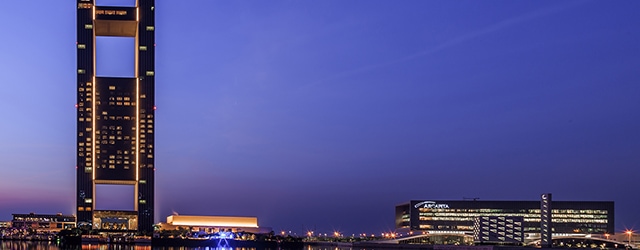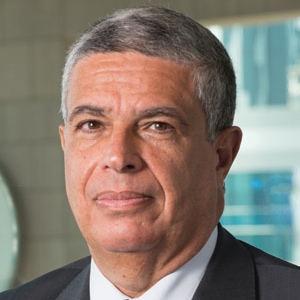The GCC’s smallest state is betting it can top its ambitious neighbors in building a fintech hub.

Paris hosted Bahrain’s King Hamad bin Isa Al Khalifa for a royal trip in April. In addition to officials and diplomats, his delegation met with tech entrepreneurs at Station F, the world’s largest startup campus; at the coding school Ecole 42; and at fintech incubator Le Swave.
“Bahrain is trying to get closer to the countries and entities that are the driving forces behind global financial innovation,” says Edouard Plus, managing director of Le Swave, who signed a memorandum of understanding with the delegation.
Once a regional banking hub, Bahrain lost its shine to Dubai in the 2000s. Today, the Gulf Cooperation Council’s smallest state aspires to leverage fintech innovation to reclaim its leading position. “We have to make a case for Bahrain alongside our neighbors,” Khalid Al-Rumaihi, chief executive of Bahrain’s investment agency, the Economic Development Board (EDB), said in May. In 2019 alone, Bahrain has signed agreements with international partners in France, the US, Turkey, India and China, which will soon operate a brand-new venture capital fund from the capital of Manama.
Bahrain has long sought to diversify its economy. Unlike its oil-rich neighbors, it started looking for alternative sources of revenue back in the 1970s. A strong banking system quickly became the focal point of this strategy. As a result, oil currently accounts for less than 20% of GDP, while financial services make up 16.5%. Today, Bahrain is home to roughly 400 financial institutions, including more than 114 licensed banks. Total banking assets reached $201 billion in April 2019, according to CEIC, and are growing steadily.
“Financial services are a key pillar of Bahrain’s economy and the biggest non-oil employer,” says Adel El-Labban, CEO and managing director of Ahli United Bank, the country’s top lender by assets. “The sector’s strength lies in a robust and progressive regulatory environment for both conventional and Islamic banks.”
Bahrain also sells its strategic location as a gateway to the region and a privileged entry point to the GCC’s largest market: Saudi Arabia. “A regional financial services base in Bahrain will put any business at the center of one of the most potent concentrations of wealth on the planet,” says Adnan Ahmed Yousif, president and CEO of Al Baraka Banking Group, the Gulf’s biggest Islamic banking group, with branches and offices in 16 countries.
Regulation and Efficiency
A strong banking infrastructure won’t necessarily make Bahrain a fintech champion, however, since virtually all GCC states are in the same race. To differentiate itself from ambitious neighbors, the kingdom is betting on a low cost of doing business, advanced regulation and efficient administration. “Bahrain enjoys a cost advantage of 35% in terms of annual operating costs for a financial services firm when compared with Dubai International Financial Centre or Abu Dhabi Global Market,” KPMG noted in a 2018 report.
To attract foreign money and talent, the island nation allows 100% foreign ownership of companies and imposes zero corporate or income taxes; a relatively new bankruptcy law makes it easier for entrepreneurs to take risks, fail and start again.
 El-Labban, Ahli United: Bahrain boasts a robust and progressive regulatory environment for both conventional and Islamic banks. |
In the last two years, the Central Bank of Bahrain (CBB) took a series of important steps, including the creation of a special fintech unit and a regulatory sandbox. It also issued a crowdfunding regulation and is working on a new rule for cryptocurrencies.
“Bahrain’s regulatory framework, and especially the sandbox, are very interesting. We have to see if that makes it the best entry point to the MENA region,” says Le Swave’s Plus, adding that he sees high potential for payments and financial markets solutions there.
Last year, Bahrain’s EDB launched FinTech Bay, a $2.5 billion project in collaboration with FinTech Consortium, a US-based incubator. Today, the facility hosts 28 companies and has over 50 global partners including Visa, Mastercard and Microsoft.
Bahrain is also home to the region’s first fund of funds. One year after inception, the $100 million Al Waha had allocated half of its resources to five regional venture funds that will set up a presence in Manama.
Underpinning these initiatives is Bahrain’s reputation for administrative efficiency—a selling point with many foreign entrepreneurs, for whom time means money. “The EDB, the central bank and FinTech Bay speak with one voice, which makes things very clear,” says Plus.
“Sometimes in the region, time tends to kill deals,” says Cormac Sheedy, head of sales for MENA at Fenergo, an Irish-based regtech firm that just signed with the Bahraini government to roll out a blockchain-based know-your-customer and anti-money laundering platform. “Bahrain knows what it wants to achieve. The business environment is responsive, quick and efficient. At decision-making level, things happen very rapidly.”
Bahrain sees a particularly ripe opportunity to be a leader in information and communication technologies (ICT). Last December, the CBB issued rules to enable open banking by the end of June. The new legal setup borrows from the EU’s second Payment Services Directive. “Bahrain was the first country in the region to officially adopt a cloud-first policy, enabling banks and government entities to upload data to the cloud,” says El-Labban.
The new regulatory framework is attracting multinationals. Chinese tech group Wonder News recently invested $50 million in a new regional office; French insurance group AXA is building a six-story MENA headquarters; and in Bahrain’s biggest coup to date, Amazon Web Services (AWS) is setting up its first data center in the region, in Manama.
“Where we locate our cloud computing regions is based on a combination of factors, including how much geographic area we can cover, the availability of renewable energy and the local government’s long-term commitment to investing in technology infrastructure,” says Zubin Chagpar, head of AWS’s MENA public sector business. “When we weighed all of our criteria, Bahrain was the right choice.”
The new data center is expected to create thousands of jobs. It is also stirring an appetite in banks and other local players to transfer part of their operations to the cloud. “The ability to store and share data at speeds the Gulf has never experienced before has the potential to help banks, corporates, small to medium-sized enterprises, entrepreneurs and governments gain competitive advantage at the global level,” says Al Baraka’s Yousif.
Fintech is far from being the only star to which Bahrain is hitching its economy. Direct investment reached a record $830 million last year, a 13.2% year-on-year increase, the EDB reports. Financial services and ICT accounted for 13% of that amount; while tourism, real estate, education, health care, manufacturing, transport and logistics made up 87%. Just like its neighbors, Bahrain has a general road map for the future, Vision 2030, which drives a $32 billion infrastructure plan across a variety of sectors—including oil.
Last April, Bahrain announced the discovery of new offshore reserves. A month later, the government set up the new Bahrain Energy Fund—hoping to raise $1 billion to further develop the energy sector—and in June of this year, the prime minister announced foreign companies would be allowed to own 100% of new oil and natural gas extraction projects upon signing an exploration and production deal.
Thanks to diversification, non-oil sectors account for 80% of the economy and grew a healthy 4.3% in 2018. But oil still contributes the bulk of government revenues (75%), making the kingdom vulnerable. After a couple of years of low oil prices, government debt, which was 30% of GDP in 2010, now stands at an all-time high of 93.4% and is expected to reach 100% in the next three years. The 2.4% economic growth forecast for 2019 depends upon a $10 billion aid package from GCC neighbors. The country introduced a 5% value-added tax in January; but unpopular measures, such as cutting subsidies or levying taxes, seem unlikely for fear of social unrest.
“Bahrain’s government debt burden will continue to rise, [due to] political and social considerations,” Moody’s concluded last December as it upgraded the banking outlook from negative to stable. “These credit challenges are set against Bahrain’s key credit strength—its relatively diversified and dynamic economy.” Fintech, Manama hopes, will be one successful way to leverage those advantages.



